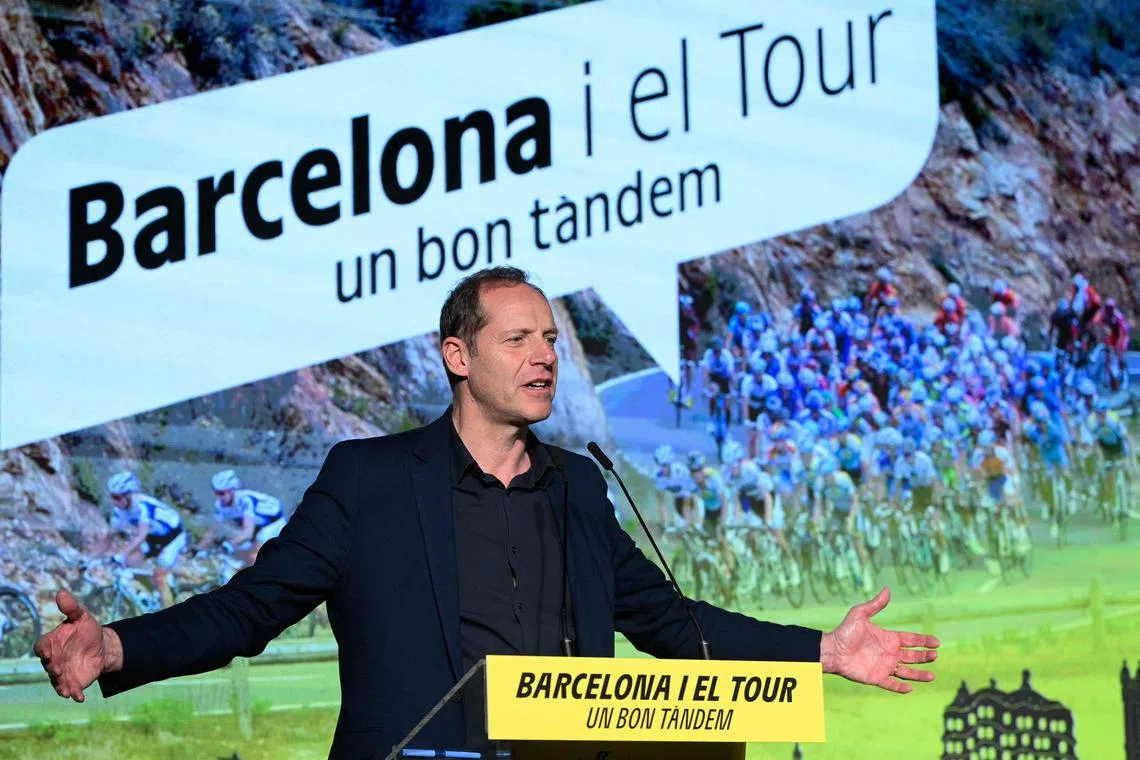For Tour de France, foreign starts are a money-spinner
Sign up now: Get the biggest sports news in your inbox

Tour de France general director Christian Prudhomme speaking during a ceremony in Barcelona, which will host the Grand Depart of the 2026 edition.
PHOTO: AFP
BARCELONA – As the Tour de France unveiled its fourth foreign start in five years in Barcelona, organisers could point to the financial logic while fending off political criticism from those who believe the world’s greatest cycling race should exclusively showcase its home country.
“We must convince the French that the start should be abroad again,” Tour director Christian Prudhomme said on Feb 25 in the Spanish city of Barcelona, while unveiling the first two stages of the 2026 Tour.
For Amaury Sport Organisation (ASO), the company that owns the Tour, the financial logic is clear.
The company does not provide figures but, several sources agree, Copenhagen in 2022, Bilbao in 2023 and Florence in 2024, each paid ASO around €6 million (S$8.5 million) to host the “Grand Depart”.
The figures do not include other expenses and investments that can double the bill.
French cities pay less. Brest forked out €3.6 million to host the first four stages in Brittany in 2021 and Lille is paying around €4.2 million for the 2025 Tour.
“It’s more expensive abroad than in France, in part because there are associated travel and accommodation costs, which are often a little higher than in France,” Pierre-Yves Thouault, ASO’s deputy director of cycling, told AFP.
The 2026 Barcelona start will be the 27th non-French starting location since the Tour first went on the road internationally in Amsterdam in 1954.
“These images, which are broadcast in 190 countries around the world, attract people because it’s their home, and then these people may go and spend their holidays in France because they discover France thanks to the Tour,” said Prudhomme.
A “Grand Depart” is costly to organise, with festivities that stretch over several days, starting with the team presentations on Thursday before the riders get going on the Saturday.
For mid-race stages the costs are lower – usually €100,000 for a start and €140,000 for a finish, said Thouault.
That does not include the extra costs, notably the road improvements required for a race of this size.
The Tour receives 300 applications to host stages every year. That proves, said Thouault, that it is worth the money.
“If we receive so many applications, it’s because there’s an interest, and, beyond the price, we also have to see what it brings for these towns in terms of visibility and media coverage,” he said.
The Tour claims to be the third-most watched sporting event after the Summer Olympics and the football World Cup – neither of which is annual.
Hosting stages also boosts the local economy accommodating and feeding the teams, the Tour “caravan” of support vehicles, the media and visiting fans.
“It is estimated, on average, that for one euro invested there are seven euros of spin-offs”, said Thouault. AFP


